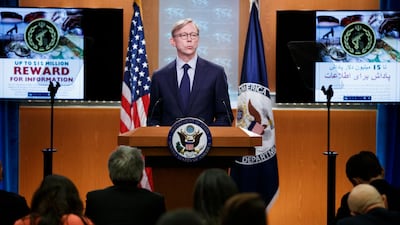Signs of further US-Iranian escalation loomed large on Wednesday as Washington imposed new sanctions on an Iranian oil shipping network that it says is operating through Syria.
The sanctions on 16 entities, 10 people and 11 ships were followed by the Trump administration announcing a $15 million (Dh55.1m) reward for information that leads to disruption of finances to Iran's Islamic Revolutionary Guard Corps.
The two announcements appeared to spell the end for a French initiative to offer Iran a $15 billion credit line through oil exports.
The US special representative on Iran, Brian Hook, in a briefing on Wednesday mentioned “tactical disagreements" with France.
“No concrete proposal has been generated,” he said, as French Finance Minister Bruno Le Maire continued his meetings in Washington.
The Treasury Department sanctioned the network of companies, ships and people it said were “directed by and financially supports the Islamic Revolutionary Guard Corps-Quds Force and its terrorist proxy Hezbollah".
It claimed the network was managed mostly through Syria and brought in $750m from oil smuggling.
Treasure said the network used more than a dozen ships to carry almost 10 million barrels of crude oil, mainly to the Syrian regime.
US Treasury Secretary Steven Mnuchin said Wednesday’s “action against this sprawling petroleum network makes it explicitly clear that those purchasing Iranian oil are directly supporting Iran’s militant and terrorist arm, the IRGC-Quds Force".
The Quds Force is the Revolutionary Guards' external operations branch.
Mr Mnuchin said the sanctions should “serve as a strong warning to anyone considering facilitating the Quds Force’s oil sales that there will be swift consequences".
Among those sanctioned is the Mehdi Group based in India and its director, Ali Zaheer Mehdi, and other people and entities operating from Lebanon.
The Treasury said the Quds Force Commander Qassem Soleimani supervised fellow force official Rostam Qasemi, a former Iranian minister of petroleum, who oversaw the whole operation.
The State Department also announced a reward with a maximum of $15m for information that helps to disrupt financing for the Revolutionary Guard and its branches, including the Al Quds.
"This includes seeking information on the IRGC's illicit oil sales, including via oil tankers like the Adrian Darya," it said.
The Adrian Darya-1, renamed from Grace 1, was recently released by Gibraltar after being detained by UK Marines for suspicion of providing oil to Syria against EU sanctions.
The reward could in be in exchange for information on sources of revenue for the Guard and its branches, or those providing finance, and on illicit schemes including oil sales operations.
The reward also covers information on front companies engaged in business on the Guard's behalf, entities or people helping the IRGC to avoid US and international sanctions, and formal financial institutions doing business with the Iranian militants.
The department is also interested in how the Guard is transferring funds and material to its terrorist proxies and partners, and details of its donors.
The reward also encompasses information on “Financial institutions or exchange houses facilitating IRGC transactions, businesses or investments owned or controlled by IRGC or its financiers, front companies engaged in international procurement of dual-use technology on behalf of the IRGC, and criminal schemes involving IRGC members and supporters, which are financially benefiting the organisation", the department said.
Mr Hook said this was the first time that a government entity came under the Rewards for Justice programme, which is usually used for non-state actors and terrorist organisations.
He also accused Iran of “nuclear extortion”.
“We did sanctions today," Mr Hook said. "There will be more sanctions coming.
"We can’t make it any more clear that we are committed to this campaign of maximum pressure and we are not looking to grant any exceptions or waivers."
He played down the possibility of a meeting between US President Donald Trump and Iranian leader Hassan Rouhani.
Mr Hook said it was no secret that Mr Trump was open to talks but the Iranians had rejected overtures.
“Iran is not used to being told ‘no’,” Mr Hook said.
He said there had to be a change in Tehran's behaviour before diplomacy could resume.
Mr Hook also reaffirmed that the US “very much supports Israel” in its attacks against Iranian proxies in Syria.
He did not comment on the recent drone attacks in Iraq apart from denying any US role.

